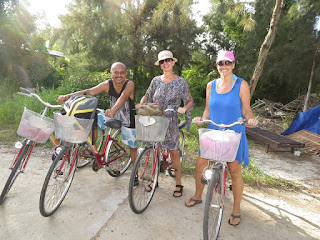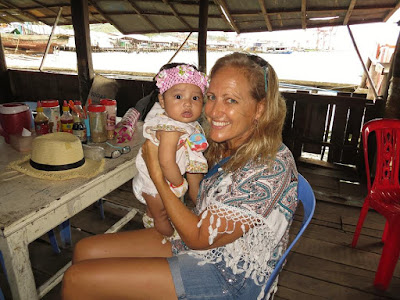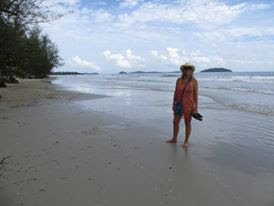Living in China is not at all what I expected. I expected more struggle and confusion, more culture shock, more...difference.
Yes, of course, there are big differences. But they aren't hard to handle. The language, for example. I have not had the time (okay, discipline) to focus on learning it the way I'd like. The "having a job" thing takes up a lot of my living time. Still, we can jump in a cab and say the right phrase to get us home. Translator phone apps help. And we are learning tricks, like collecting business cards, taking pictures of the fronts of buildings, or having someone write down our destination in Chinese. Just show the card or picture to the cabbie, and you're off.
Dave is a master at "getting the gist" of what someone is saying. The other day, the paint guy delivered another batch for Dave's ongoing project of painting our apartment. When he came in, talking away in Chinese, Dave answered in English and showed him around. I couldn't help but laugh because, seriously, this is what it sounded like:
Paint man: xxxx xxxxx xxxxx
Dave: Yes, see, we are using the dark blue as the accent wall in the bedroom.
Paint man: xxxx xxxxx xxxxxx xx xxxxx!
Dave: I know, right?
This has been our experience with most people: they enjoy interacting with us. They love to stop and ask us questions (Where are you from? Do you like China?) and take pictures. Yes, sometimes all the attention is a bit unnerving. Like when strangers crowd around you, wrap their arms around your waist and take a selfie. And another and another...until you have to smile and say xie xie (thank you) and sidle away.
Sometimes I'm just standing somewhere talking with a friend, and out of the corner of my eye I see several people snapping our pictures. It's only fair, though. I often take pictures of charming strangers. No double-standards here.
I thought this attention was all about my whiteness...until I met an African American guy who has lived in China for 5 years and said it constantly happens to him, too. In a city of 8 million people where 7,999,900 have straight black hair and are of a smallish stature, a tall blonde or an even taller black guy with a bright white smile is a total trip.
 |
| Willie and me |
How most of the Chinese people are so slender is a mystery to me, given the abundance of great, inexpensive food. Yesterday morning we rode our bikes to the campus open-air market. In addition to voluminous, fresh produce, you can buy lots of odds and ends. I picked up reading glasses.
We bought a pomello, my new favorite: pink and juicy and such a satisfying texture. Almost the size of a bowling ball and wrapped like a present in a lovely wax paper. Every one is a gift, for sure. We also picked up passion fruit (another new favorite), small creamy bananas, and a big bag of oranges for just a few bucks.
 |
| yum |
We have not yet bought meat or fish there. Perhaps our western sensibilities just aren't ready to pick from the mountainous slabs of raw meat, or to face a woman pulling a fish from a bucket of water and clubbing it to death for our dinner. Usually we get already-cooked chicken and duck at the fantastic deli in the grocery story, where we also buy delectable noodles and dumplings.
Then there's Yann, a French guy who lives above us who cooks amazing soups, pastas and desserts and sells them at a reasonable price. I mean, really? We have a French chef delivering to our door?
The last months have been a whirlwind of activity, combined with the madness that is midterms. The bureaucratic wackiness involved in creating and administering the midterm is not something I want to re-experience by writing about it. Suffice it to say that it involved illogical and time-consuming procedures, and : a) I freaked out then b) I calmed down. After all, working for a California state university has prepared me for the bureaucracy of a Chinese university. Dave (bless his heart) stepped up to crunch numbers and deal with documents I felt like burning. And now it's clear to me what needs to be done, so the next go-around will be easier.
Other than that, the job has been mostly delightful. In contrast to what people had "warned" me about--that Chinese students are not creative--the students are writing inspired poetry, creating extraordinary video poetry interpretations, and taking lots of creative leaps. In the memoir class, they love to perform scenes from the book. Daily I am discovering how they learn and what they are capable of, and I plan to redesign my courses for next semester in hopes of becoming an even more effective teacher.
(The only thing I don't think I will get used to is calling students by their chosen English name--when they are Hamburger, Watermelon and Xylitol.)
The abundant social activities have included a big Halloween party right out our front door...
An American expat Thanksgiving potluck featuring a fruit turkey:
 |
| Made by our friend Fran, from Nashville |
A student talent show:
 |
| That's Tina on the left. |
And a faculty dinner that featured the most honest presentation of a cooked chicken I've ever seen:
Okay, so maybe not all of the food here is delicious. Boiled chicken ain't my thing. Neither are insects.
 |
| Centipedes on a stick and other delicacies at the night market. |
I took a few nibbles. It was delicious, albeit not very satisfying because there's not much meat on it. The little bones make it complicated, kind of equivalent to the labor of eating a pomegranate. The pot was filled with other delectable things: potatoes, tofu skin, tofu cubes, quail eggs, taro root. Next they brought out lotus root and a huge plate of seafood on ice also to be cooked in the savory broth: crab, shrimp, octopus, mussels, clams, and cockles. A side-dish was a Nanning specialty: tasty noodles with little snails. Yep, I even ate little snails. And liked it.
 |
| duck feet and tofu |
 |
| the perfect choce |
 |
| The current-day version of the family-on-a-bike. (This is in Vietnam, but you also see families like this in China.) |
After the purchase of the bike and the eating of the duck feet, Tina told us she had something she wanted to say, launching into what seemed to be a prepared speech about how much we mean to her. She had barely begun when tears started streaming down my face. She thanked us for being so friendly, for never losing patience when she's trying to figure out something. She recounted the fun experiences we've had, and said, "You have taught me thing about life." She recalled when we went to the bank one day and it was so crowded that we decided to leave and come back another time. "You said when things are 'chaos'" (she remembered learning that word from Dave) "that it's better to go away and do something else." She also said she has learned from us to appreciate the small things in life. And she was especially touched when one day I told someone she was like our Chinese daughter. She really is. Truly, I love her with all my heart and am amazed China has given us the gift of her.
As if that's not enough, for my birthday, Tina made me the most amazing scrapbook that includes pictures of all our adventures.
This took place at Café Ukulele, where we'd gone for live music. The evening began to reveal itself as a surprise party for me. Paul sang my favorite song, "Into the Mystic", which he had just learned that afternoon. Two other teachers brought a cake, and everyone sang Happy Birthday.
Earlier that day, my students had also sung Happy Birthday to me in both English and Chinese. I had brought into class a huge cake that the school had delivered to me. Apparently the university does this for all the teachers on their birthdays. It was a beautiful cake, ringed on the top with fruit...and tomatoes. The taste was, well, strange. One of the teachers has dubbed these "disappointment cakes." Fortunately, it didn't go to waste. The students loved it.
Paul's birthday fell just a few days after mine, so we were soon back at his Café Ukulele for another evening of music. The place was packed in honor of this guy from Liverpool who has created a vibrant music scene in Nanning, incorporating Chinese and expat musicians into his show. I read a poem I wrote for him, and 5 cakes (no tomatoes in sight) were brought out.
Dave's birthday gift to me was an overnight at a natural hot springs resort. Just a 30 minute taxi ride from our house, it boasts 100 pools, small and large, as well as saunas, mud baths, and fish-nibbling foot treatments. I soaked for five hours, napping in between on the stones. Later, Dave and I lay on warmed slabs of marble beneath an awning for another nap. That night I slept 10 hours. I guess I needed it. In fact, I have been sleeping a lot lately. As "easy" as living here is, it takes a different kind of energy to live and work in a completely different culture. My body and mind need regular recharging.
 |
| Jiuquwan Hot Springs. The big cold pool and small warm pools. |
 |
| ahh.... |
Fortunately, we made it, shaken if not stirred, and got right into the swing of things with a street food dinner.
 |
Also cheap are spa treatments, so we treated ourselves to massages and pedicures, and I went to a hair salon. It's quite a contrast, the quiet solitude of the spas and the frantic activity outside: all the motorbikes and cars careening down the narrow streets amidst gaggles of pedestrians and people hawking every item you can imagine.
 |
| egg man in Hanoi |
The streets around the lake are closed off Friday through Sunday, so it's relaxing to walk around, people watch, and grab a drink at a sidewalk café. We lucked across some music, too.
Everywhere we went there were people dressed in beautiful clothes, posing for pictures. At the Temple of Literature, the site of the first university in Hanoi which is over 1000 years old, we caught college students celebrating their graduation.
One touristy thing we did was attend a water puppet show. The audience was filled with Western retirees. I suppose we are part of that target market. The stage is filled with water, the puppets manipulated by poles from behind a screen. Charming people, birds, fish, dragons, and water buffalo danced out the old stories, accompanied by very good musicians playing traditional tunes.
 |
| water puppets |























































